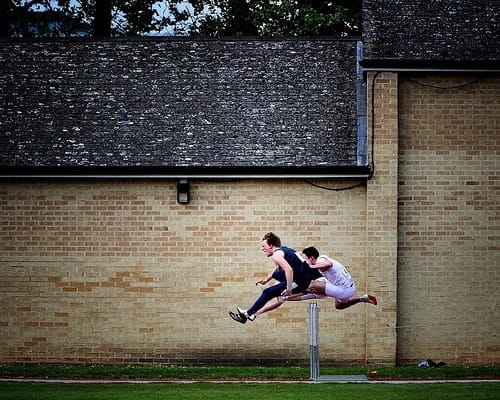Leap over you professional plateau.
(This post is a copy of my article for the Guardian Teacher network)
I’m a huge football fan and I always have been since my father took me to watch Everton with the promise of dour football and a lukewarm pie. Such inspiration led me to play football almost continuously throughout my childhood to the present day. If I was to total my hours of practice it would surely be in the thousands. In fact, it would near the 10,000 hours total which has been associated with becoming an expert by people in the know.
Only I am not an expert. I am little better than I was when I was a spotty teenager. A long time ago I stopped improving at football. I had reached my ‘ok plateau‘. I was no Wayne Rooney and I had accepted that I was going to be ok as a happy amateur. So how does my football practice explain the problem of teacher improvement?
The author, Joshua Foer, originated the term ‘ok plateau’ in his popular science book, Moonwalking with Einstein, on the subject of improving memory. He used it to describe that common autopilot state when you have habitually mastered the basics of a task, but despite being skilled you stop really improving to reach expert status; you simply plateau in performance.
Teachers are as prone as any other profession to this state. After our time as a trainee and NQT, when we are grasping new knowledge and making successful connections, our improvement slows, sometimes to a stop. This, unsurprisingly correlates with a decline in regular coaching.
The evidence, from Rivkin, Hanushek and Kain (2005), is that after the first couple of years teacher quality reaches a plateau and teacher experience beyond this point has a negligible impact upon student attainment. This clashes with our basic presumptions about experience in teaching and it should certainly give us thought.
I believe I experienced a similar ‘ok plateau‘ for at least five or six years. After mastering the craft of behaviour management and getting to know the nuts of bolts of teaching English I was simply happy to be doing a good job. With the storm of demands created by workload, any improvement beyond this point seemed fanciful. I stopped reading about teaching and learning and I stopped being coached with genuine regularity.
Part of the problem is our system of continuous performance development (CPD). This system is tied to targets and professional standards that actually inhibit conscientious teachers taking risks and experimenting with new teaching strategies. We set targets, either consciously or subconsciously, so that we may meet them, regardless whether they genuinely improve our practice or not. Gone is the regular critical feedback of our first couple of years. We move into autopilot, often even entering a state of professional inertia.
There are no quick fixes to the issue of genuine continuous teacher improvement. One method is to undertake consistent coaching systems that better imitate our earlier state as training teachers. We need to separate the judgemental CPD targets from genuinely developmental strategies, like coaching in departments. In my school we are employing a team of expert coaches to drive research and personal coaching across the school. In departments, we are also moving to a more personalised coaching model where feedback is constructively critical and consistent, with time allocated to do this.
A key issue is that experienced teachers are not undertaking the most effective method to continuously improve; deliberate practice (see my blog post on the subject here. ‘Deliberate practice’ involves chunking smaller aspects of pedagogy and repeating that practice with lots of immediate coaching feedback. When I play football I get no specific feedback, it is trial and error, with lots of uncorrected errors. Deliberate practice is about a self-critical process of reflection and gradually, but consistently, raising the level of challenge. It is the responsibility of the teacher to be committed to such time consuming and challenging practice, but it is also the responsibility of school leaders to support teachers and to create fertile conditions for such development.
There are many books that delineate effective deliberate practice and support successful teacher coaching, such as Practice Perfect, by Doug Lemov, or Talent is Overrated, by Geoff Golvin, so teachers can take some control of their own development if their school conditions prove barren.
Many teachers are now writing blogs to reflect on their practice; undertaking action research, attending TeachMeets, or connecting with other teachers in professional networks, such as Twitter, to develop their pedagogy. There is such a passion and commitment to our vocation that I see every day in our profession that is heartening.
I may be a bit past my dream of playing for Everton, but with the right type of practice and support I can improve to eventually become an expert teacher. When Dylan Wiliam popularises research that proves that students with the best teachers learn twice as fast as average then our pursuit of excellence, with effective coaching and deliberate practice, could just make a transformative difference for our students.






Comments